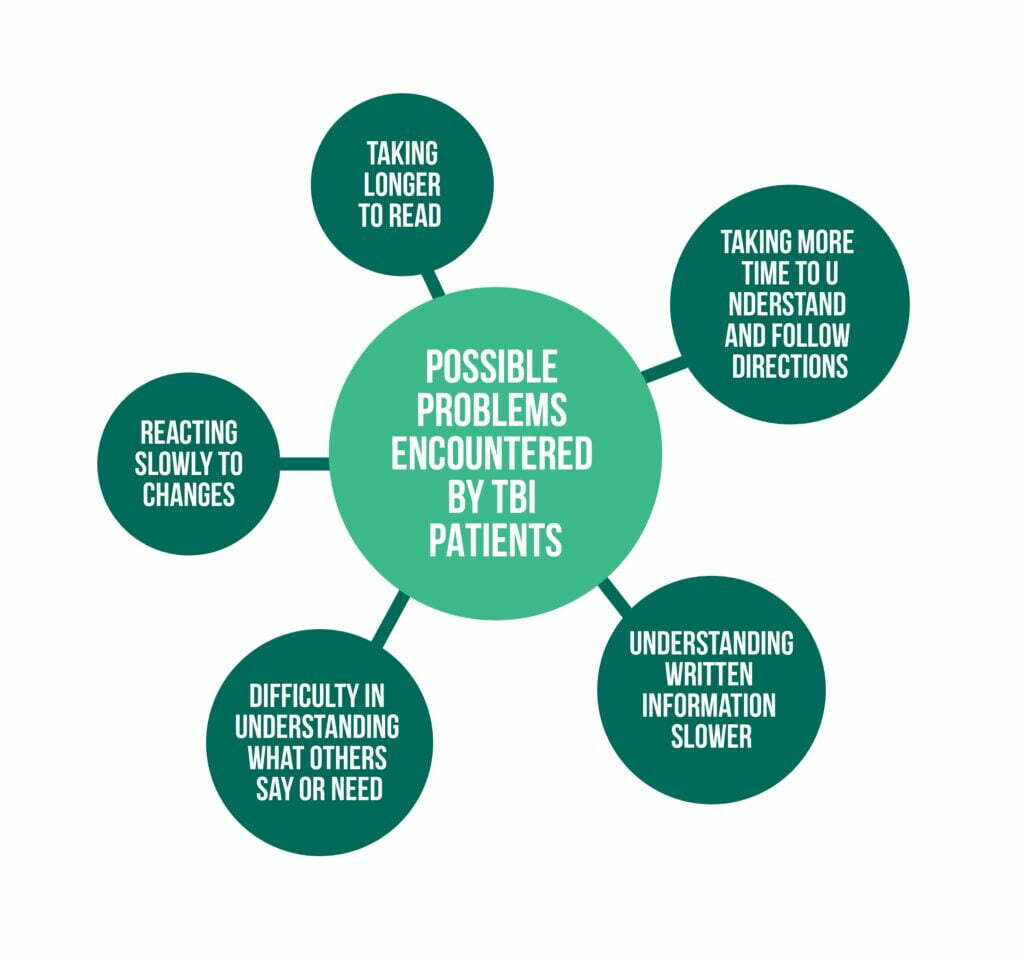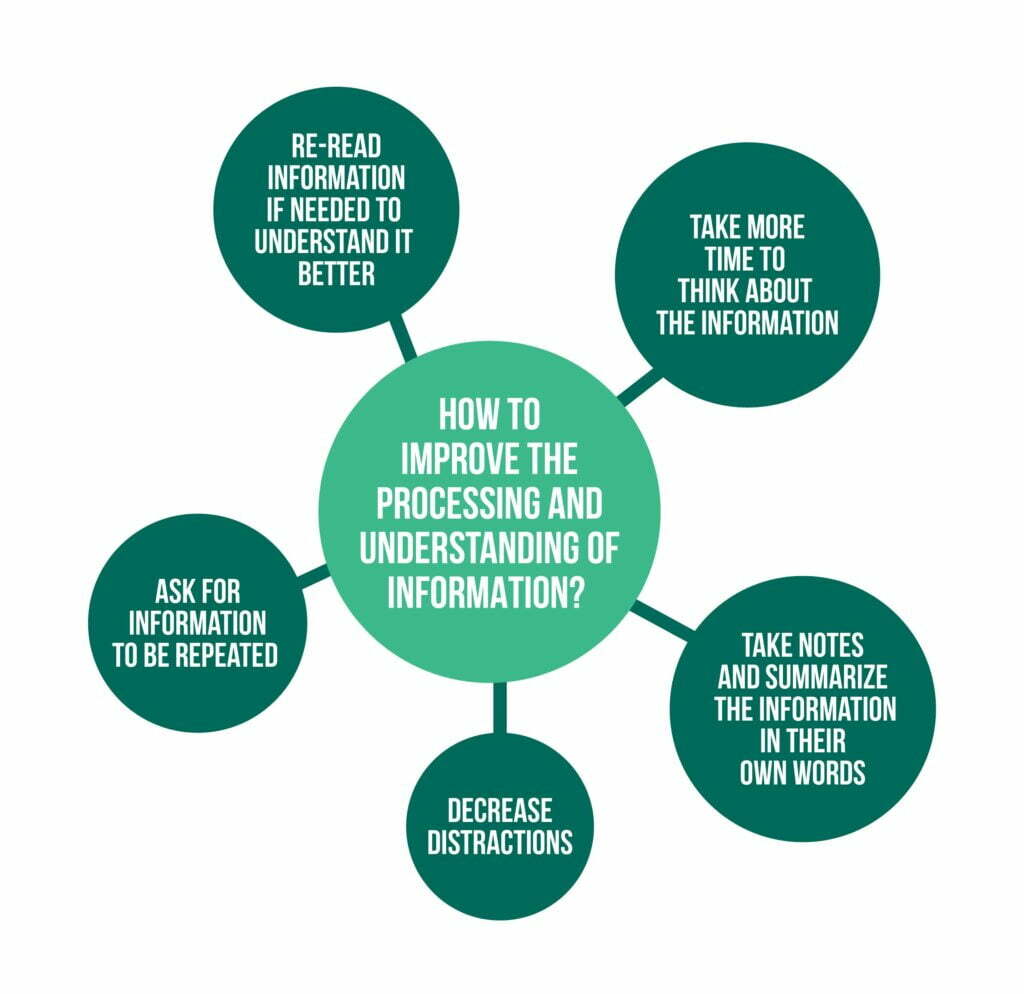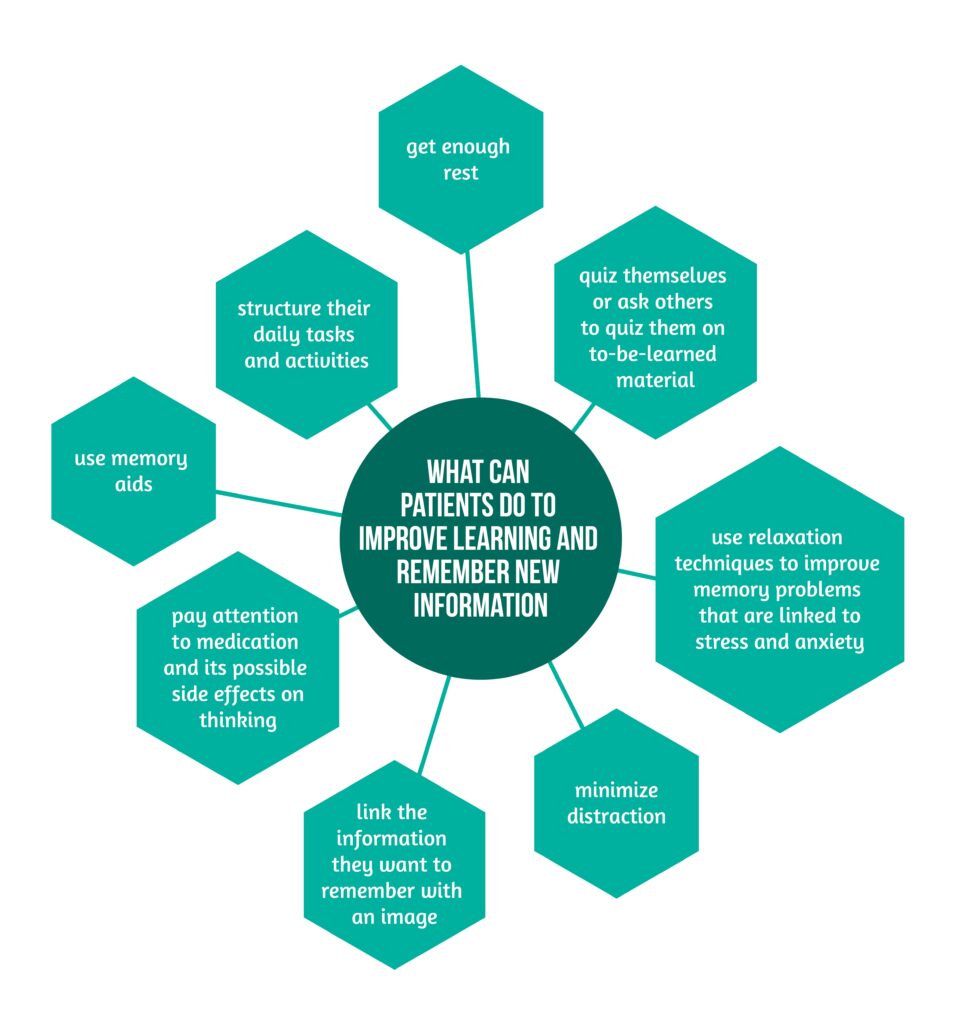Keywords: TBI, cognition, improvement
Cognition and TBI – can patients improve cognition after a TBI?
Traumatic brain injury (TBI) represents an alteration in brain function caused by external forces. These forces may result in vascular and axonal damages, edema, and neuronal cell death. It is well known that TBI represents the leading cause of death and disability around the world [1]. In addition, cognition, which means knowing or thinking, can be impaired after a TBI. Learn more about what happens to a patient suffering a TBI.
Cognitive abilities affected:
- Attention
- Processing and understanding information
- Memory
- Planning, organizing
- Reasoning, judgment, and decision-making
- Behavior
- Communicating thoughts

What are the affected cognitive abilities?
Attention
Regardless of the severity of the injury, attention impairment is one of the most frequently reported sequelae after TBI [2].
Patients most frequently describe:
- the inability to adequately focus and sustain attention on a particular target
- difficulty following a conversation
- inability to remember what they saw on TV
- difficulty in supporting correct and clear thinking steps [3]
How can a patient’s attention be improved?
- decrease distractions such as laptops, smartphones
- focus on one task at a time
- take breaks whenever needed
- get enough rest
- practice attention skills – simple and practical tasks such as balancing a checkbook, reading a short story
- talk to a clinician if one feels that his/her mood interferes with their concentration
- pay attention to medication side-effects

Processing and understanding information
Normal functioning of sensory input is necessary for information processing. However, patients with TBI often present a slowing down in processing information [4].
What problems could these patients present?
- taking more time to understand and then follow directions
- taking longer to read
- understand written information slower
- difficult understanding of what others say or need
- reacting slowly to changes

What can patients do to improve their processing and understanding of information?
- take more time to think about the information
- re-read information if needed to understand it better
- ask for information to be repeated
- take notes and summarize the information in their own words
- decrease distractions

Cognitive communication
Studies indicate that changes in cognition and communication are frequently reported as long-term consequences of TBI in young and older patients [5]. It can vary from milder problems to more important and severe ones:
- difficulty in finding the right word
- rambling or getting off-topic easily
- troubles expressing their thoughts and feelings through facial expressions, tone of voice, and body language
- having problems understanding nonverbal communication, jokes, and sarcasm
- aphasia (means that impairs the patient’s ability to comprehend and formulate language)
How can communication be improved?
- working with a speech therapist
- asking people to speak slowly
- requesting people to repeat their statement
- practicing communication one on one with the help of family and friends
- asking questions if they feel they did not understand something
- making a plan in advance of what they want to communicate
Learning and remembering new information
Memory is another essential component of cognition that can be affected after a TBI, and is one of the main causes patients see a doctor. Unfortunately, studies show that memory is one of the cognition constituents that recovers relatively slower after a brain injury [6].
What can patients do to improve learning and remembering new information?
- use memory aids
- minimize distraction
- get enough rest
- structure their daily tasks and activities
- link the information they want to remember with an image
- use relaxation techniques to improve memory problems that are linked to stress and anxiety
- pay attention to medication and its possible side effects on thinking
- quiz themselves or ask others to quiz them on to-be-learned material [7]

Planning and organizing
After a TBI, patients have difficulties in goal setting and planning new initiatives in advance; it was reported that most patients with frontal lobe lesions following a TBI have this type of problem. As a result, their everyday functioning is often severely impaired [8].
How can this be improved?
- setting a goal [9] and establishing the steps needed to reach that goal
- using smartphone apps that help with organizing activities and events
- breaking down activities into smaller steps
- getting enough rest
- asking for help from others to plan and achieve their goals
Judgment, reasoning, problem-solving, and self-awareness
Problem-solving skills, reasoning, and judgment are frequently impaired after a TBI. As a result, patients require help to move on and improve their functional outcomes.
What are the main areas where TBI patients could have problems?
- deciding the best solution for a problem
- judging what is safe vs. unsafe
- being aware of cognitive problems, even if these problems are evident to others
- analyzing information
- having awareness of social limits and other people’s feelings
How can patients help themselves improve their skills?
- having a problem-solving strategy
- being flexible in the way they think and being open to changing the way they think
- defining a goal and plan the steps needed to take to reach that goal
- getting help from a family member/friend/colleague and asking for their feedback
- thinking clearly and ahead of time about the consequences of their actions
- resting before making a decision
Rehabilitation is essential for TBI patients and is an essential part of neuropsychology. Family plays a vital role for these patients, and the help they can offer is crucial for recovery.
How can family members help the recovery of TBI patients with cognitive problems?
- attend therapy sessions with the patient to help reinforce skills that are being thought
- problem-solve together instead of solving the problems for them
- give realistic and supportive feedback
- take the necessary time to help them arrive at a solution
In conclusion, every person is different, and it is tough to predict how a patient’s cognition will improve in time. Still, it is vital to keep in mind that cognition can improve with the help of specialists (clinicians, occupational therapists, speech therapists, neuropsychologists), family, and friends.
References
- Cristofori, I. & Levin, H. S. Traumatic brain injury and cognition. in Handbook of Clinical Neurology vol. 128 579–611 (Elsevier, 2015). DOI: 10.1016/B978-0-444-63521-1.00037-6
- Stierwalt, J. A. G. & Murray, L. L. Attention Impairment Following Traumatic Brain Injury. Semin. Speech Lang. 23, 129–138 (2002). DOI: 10.1055/s-2002-24989
- Arciniegas, D. et al. Attention and memory dysfunction after traumatic brain injury: cholinergic mechanisms, sensory gating, and a hypothesis for further investigation. Brain Inj. 13, 1–13 (1999). DOI: 10.1080/026990599121827
- Ashley, M. J., Ashley, J. & Kreber, L. Remediation of information processing following traumatic brain injury: a community-based rehabilitation approach. NeuroRehabilitation 31, 31–39 (2012).
- Shorland, J., Douglas, J. & O’Halloran, R. Cognitive-communication difficulties following traumatic brain injury sustained in older adulthood: a scoping review. Int. J. Lang. Commun. Disord. 55, 821–836 (2020). DOI: 10.1111/1460-6984.12560
- Vakil, E. The effect of moderate to severe traumatic brain injury (TBI) on different aspects of memory: a selective review. J. Clin. Exp. Neuropsychol. 27, 977–1021 (2005). DOI: 10.1080/13803390490919245
- Sumowski, J. F. et al. Retrieval practice: A simple strategy for improving memory after traumatic brain injury. J. Int. Neuropsychol. Soc. 16, 1147–1150 (2010). DOI: 10.1017/S1355617710001128
- Dritschel, B. H., Kogan, L., Burton, A., Burton, E. & Goddard, L. Everyday planning difficulties following traumatic brain injury: a role for autobiographical memory. Brain Inj. 12, 875–886 (1998). DOI: 10.1080/026990598122098
- Catroppa, C. & Anderson, V. Planning, problem-solving and organizational abilities in children following traumatic brain injury: Intervention techniques. Pediatr. Rehabil. 9, 89–97 (2006). DOI: 10.1080/13638490500155458




